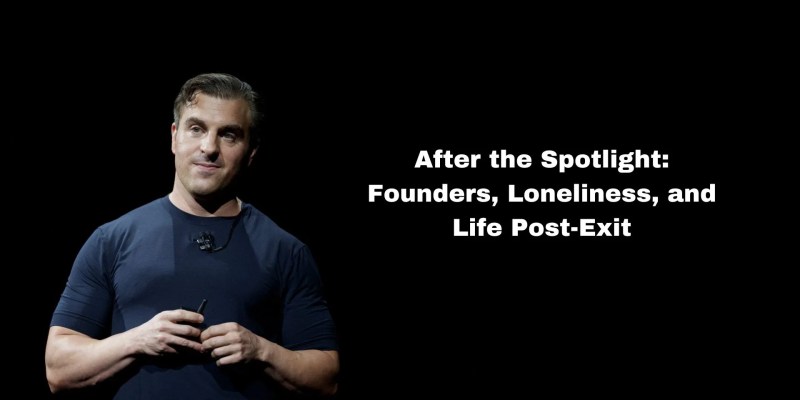The Post Exit Low
The High Price of Success: Brian Chesky’s Journey Through Loneliness After Airbnb’s IPO
When Airbnb went public in December 2020, it was hailed as one of the most remarkable IPOs in history. Shares opened at $144.71, skyrocketing 113% above the initial offering price of $68, and catapulting the company’s valuation to a staggering $103 billion—nearly six times its valuation just eight months prior. To put that into perspective, Airbnb’s market cap surpassed the combined valuations of Marriott, Hilton, and Hyatt, the nation’s three largest hotel chains.
For Brian Chesky, Airbnb’s co-founder and CEO, it should have been the pinnacle of achievement. But the moment he reached the summit, he was consumed by a profound emptiness. His Post Exit journey would take an unexpected turn, and he admitted later, “It was one of the saddest periods of my life.
Growing up in a middle-class household with social worker parents, Chesky believed success would bring him adoration, solve all his problems, and fill the void within. “I had this image that if I got successful, I’d have all these people around me, all this love, all this everything, and my life would be fixed,” he reflected. Yet, when Airbnb hit its $100 billion valuation, he was lonelier than ever—and he recognized it was a consequence of his own choices.
Sacrifices on the Climb
Chesky and his co-founders, Joe Gebbia and Nathan Blecharczyk, were inseparable during Airbnb’s early days in 2008. They worked relentlessly, building the company from scratch. But as Airbnb grew, he felt a gnawing guilt every time he spent time with friends or family instead of focusing on the business. “I wasn’t enough,” he recalled, channeling his energy into grueling 18-hour workdays.
By the time Airbnb became a global juggernaut, the bonds between Chesky and his co-founders began to shift. “The people working for me had families themselves,” he said, noting the growing “power imbalance” between himself and his co-founders, who had transitioned into employees.
Then came the pandemic. Travel ground to a halt, Airbnb’s sales plunged by 80% in just eight weeks, and the company had to lay off nearly 25% of its workforce. Yet, by the end of 2020, Airbnb had staged one of the most dramatic comebacks in business history. Its IPO was a triumph—but Chesky experienced it in isolation, alone on Zoom calls.
“At the bottom of the mountain, you have hope,” he said. “But the problem is when you get to the top of the mountain, oftentimes you are at the top by yourself, disconnected.”
Obama’s Advice and Rediscovering Roots

Source: The Obama Foundation
At his loneliest, he turned to a surprising mentor: former President Barack Obama. The two had met during Obama’s presidency and stayed in touch. When Chesky reached out to him after the IPO, asking how he stayed grounded during the height of his career, Obama offered a simple but profound insight.
“He said: You’re connected to your roots, and your roots are the relationships in your past,” Chesky shared. Obama suggested nurturing close friendships with around 15 people.
He took this advice to heart, reflecting on how much he had isolated himself. Reaching out to his childhood and college friends “totally changed everything” about his life. While he didn’t specify if he reconnected deeply with his Airbnb co-founders, he acknowledged that rebuilding relationships outside the business filled the emotional void.
“No one told me when I started on this journey how lonely it would be,” he said. “Success doesn’t fill the hole in you.”
Echoes of Evan Williams
Chesky’s story isn’t unique among tech entrepreneurs. Evan Williams, co-founder of Twitter, experienced a similar emptiness after his own career-defining successes. His creations transformed the internet, connecting millions of people and reshaping how the world shares information. But behind the public acclaim and billion-dollar valuations, Williams found himself grappling with a profound emotional void. His post-IPO struggles were not just the byproduct of professional demands but a deep reckoning with loneliness, strained relationships, and the unintended consequences of his digital empires.

Source: Wikipedia
Through introspection and a renewed focus on relationships, he embarked on a journey that led to the creation of Mozi, a platform designed to mend the disconnection that often plagues a hyper-connected world.
From Public Triumph to Private Struggle
In 2013, Twitter went public, skyrocketing to a valuation of $24 billion. For many, this would mark the pinnacle of entrepreneurial success. Yet for Williams, the IPO was not a moment of celebration but the beginning of an emotional unraveling. The public scrutiny and relentless pace of running a tech giant left little room for personal reflection.
His journey from Twitter to Medium, another ambitious venture aimed at fostering meaningful content creation, was marked by corporate challenges and unmet expectations. Despite Medium’s promise, it failed to live up to its lofty mission or its $600 million valuation. By the time Williams stepped down as CEO in 2022, he was drained—professionally and personally.
“I had underinvested in my friendships,” he admitted. The pandemic laid bare the fragility of his social connections. A divorce and two cross-country moves left him untethered. Approaching his 50th birthday, he faced a stark realization: while his platforms had connected millions, his own relationships had withered.
A Search for Meaning
Williams’ introspection led him to a pivotal insight: “Everything that had gone really well, even in work, was about relationships, and everything that went poorly was mismanaging relationships.” His pain was rooted not just in isolation but in a deeper understanding of what he had missed in his pursuit of success.
The idea for Mozi emerged as a remedy for his own struggles. Unlike traditional social media, Mozi aimed to return to the original intent of social networking—helping people stay connected with those they already know. He envisioned a tool that would foster in-person interactions without the distractions of likes, posts, or endless scrolling.
The platform isn’t designed to keep users glued to their screens. Instead, it functions as a utility—a digital Rolodex that organizes contacts by location and travel plans, enabling friends to connect in real life.
With Mozi, Williams is not just building a product; he’s crafting a vision for a more intentional way of living. The app encourages users to prioritize their social bonds, to step away from the digital noise, and to invest in the people who matter most.
As he reflected on turning 50, his son described it as “halftime.” For the entrepreneur, it was a powerful analogy—one that symbolized the opportunity to reshape his legacy in the second half of his life.
The Pain Behind the Progress
Williams’ journey to Mozi wasn’t just about creating another start-up; it was a deeply personal response to years of emotional neglect. He openly acknowledged the challenges of building healthy relationships, admitting that he had not been raised with strong relationship models.
“I learned late in life what a healthy relationship and conflict resolution looked like,” he shared. “That was the cause of a lot of my pain and suffering.”
His experiences highlight a truth that resonates beyond the tech world: professional success cannot replace the fulfillment of meaningful connections.
Like Chesky, Williams discovered that relationships—not accolades or valuations—are what truly sustain us. Both men learned the hard way that while success can catapult you to dizzying heights, it often leaves you yearning for the simple, grounding ties that matter most.









